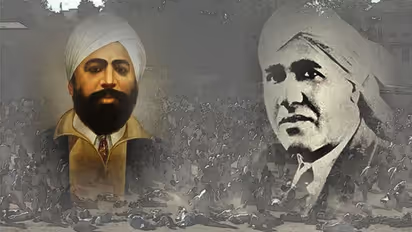India@75 Freedom Fighters: Udham Singh, the unknown freedom fighter with an interesting name

Synopsis
Udham Singh was the little-known freedom fighter in the books of history who avenged the Jallianwala Bagh Massacre.
Born on December 26, 1899, in the village of Sunam in Punjab's Sangrur district, Udham Singh was the little-known freedom fighter in the books of history who avenged the Jallianwala Bagh Massacre.
Singh lost both parents early and was taken to an orphanage with his elder brother in Amritsar. Punjab was experiencing intense political unrest, and Singh grew up witnessing it.
When Mahatma Gandhi called for the nationwide hartal to oppose the Rowlatt Act (an act that essentially extended and strengthened repressive wartime measures) was widely supported mainly in Punjab on April 6 and on April 9. The Lt Governor Michael O'Dwyer was heading the British administration in Amritsar and was panicked by the actions.
The revolt against the British ruled for Independent India was the dream of every Indian. Singh, from childhood till adolescence, noticed all the actions. The significant impact was of the Jallianwala Bagh incident. He saw Brigadier-General Dyer arriving with his troops and opening fire at the unarmed civilians where more than a hundred died and 1,400 reportedly injured. However, unofficial records put the tally much higher. Singh, then 20, was intensely scarred by the event and soon participated in the freedom movements in and outside India.
Singh hence kept travelling abroad to secure support for fellow Indians for their movement. In 1927, he returned to Punjab (Bhagat Singh asked him to) as a carpenter working on a ship heading back to India. The same year he was detained and jailed for four years till 1931, the charges were possession of illegal arms and running the Ghadr Party's radical publication, Ghadr di Gunj.
In 1931, Singh was released but was unable to escape the surveillance of the British police as he was closely associated with Bhagat Singh's Hindustan Socialist Republican Association. Singh reached Kashmir and later fled to Germany.
Singh landed in England in 1933 with a drive to eliminate Michael O'Dwyer. Singh bore O'Dwyer is responsible for the brutality of the Jallianwala Bagh massacre eventually O'Dwyer called the event a 'correct action.' On March 13, 1940, Singh learned that Michael O'Dwyer planned to speak at London's Caxton Hall meeting. Singh hid a pistol in his overcoat on the conference day and slinked into Caxton hall. After the meeting concluded
O'Dwyer was moving away from the platform, that's when Singh shot twice at O'Dwyer. Singh did not resist arrest or flee, he was immediately taken into custody.
While facing trial, Udam Singh announced his name as Ram Mohammad Singh Azad, it was tattooed on his arm, symbolizing all religions in India stands equal opposing against British rule. Singh was convicted and sentenced to death. On July 31, 1940, Singh was hanged at Pentonville Prison, the UK, buried within the prison grounds.
Later in 1974, Singh's remains were unearthed and repatriated to India before being cremated at his hometown in Sunam village in Punjab. His ashes were then scattered in the Sutlej river.
The most exciting part was Singh has also been mentioned in Salman Rushdie's novel, Shalimar the Clown. As the character of Zainab Azam (from the book) says: "For every O'Dwyer, there is a Shaheed Udham Singh, and for every Trotsky, a Mercador awaits."
Also Read: 5 things to know about 'Sardar Udham' before watching the Vicky Kaushal starrer movie
Also Read: Renovated Jallianwala Bagh Smarak unveiled; PM says India can't ignore horrors of its past
Stay updated with the Breaking News Today and Latest News from across India and around the world. Get real-time updates, in-depth analysis, and comprehensive coverage of India News, World News, Indian Defence News, Kerala News, and Karnataka News. From politics to current affairs, follow every major story as it unfolds. Get real-time updates from IMD on major cities weather forecasts, including Rain alerts, Cyclone warnings, and temperature trends. Download the Asianet News Official App from the Android Play Store and iPhone App Store for accurate and timely news updates anytime, anywhere.